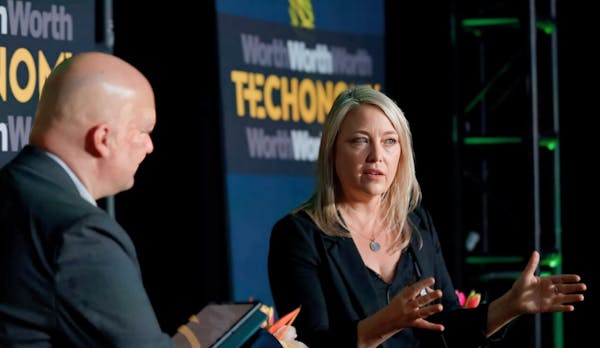Connecting climate change and mental health: Unveiling the hidden crisis
There is no question that climate change is having a devastating effect on our environment and communities. Yet, one often overlooked aspect is the impact it has on mental health.
There are clear links between climate-related events and anxiety, grief, depression, violence, and suicide. In an uncertain world shaped by climate change, prioritizing mental health care is imperative for fostering resilience and well-being.
On May 14, 2024, Kaiser Permanente and the World Economic Forum hosted an enlightening event as part of the 'Connecting Climate Change and Health' series. Leaders from diverse sectors came together to share valuable resources and insights on prioritizing mental health and equity with a focus on the workforce, youth, and families. The event was broadcast live on We Don't Have Time, aimed at charting a path towards a healthier, more resilient future for all.
Welcome remarks
Dr. Shyam Bishen from the World Economic Forum opened the event by emphasizing the crucial link between climate change and mental health. He highlighted the necessity for global collaboration to address these intertwined crises.
According to recent data, over 40% of 7,000 respondents in a social media poll reported that their mental health or that of their loved ones had been impacted by climate-related events.
Fireside chat with Hawaii Governor Josh Green, MD
Governor Josh Green shared the harrowing experiences from the Maui wildfire on August 8, 2023. The wildfire, driven by climate change, caused significant loss of life and property, leading to widespread psychological distress.
He stressed the importance of a holistic approach to recovery, including addressing the mental health impacts of such disasters. Governor Green highlighted the severe psychological impact on individuals who witnessed or experienced the wildfire.
Many people faced trauma, leading to heightened levels of depression, anxiety, and PTSD. He shared poignant stories of survivors, including a 15-year-old who had to drive his family to safety for the first time and an elderly man who couldn't save his wife from their burning home.
Beyond the immediate psychological impact, the wildfire also caused significant economic challenges, such as housing insecurity and increased costs of living. These stressors further exacerbated mental health issues within the community.
Governor Green emphasized the need for a comprehensive approach to recovery that includes both immediate and long-term mental health support. He advocated for trauma-informed responses and the importance of community and governmental support in rebuilding and healing.

The famous banyan tree in Lahaina Harbor, Maui, Hawaii, taken before the August 2023 fire. Reports have come in that the tree is recovering and once again blooming, signifying Nature's resilience. Image credit: © Mike7777777 | Dreamstime.
Panel Discussion: The Intricate Link Between Climate Change and Mental Health
Moderator Jennifer Uchendu the Founder of SustyVibes, an online community for young Africans who want to make the world and their lives more sustainable, guided a discussion with esteemed panelists who provided valuable insights on current research and practical interventions.
Key insights into new research with Dr. Andrea Mechelli
Dr. Mechelli, Professor of Early Intervention in Mental Health at the Institute of Psychiatry, Psychology & Neuroscience, King's College London, focused on the evolving research trends and the need for actionable solutions. Key points from his discussion include:
- Shift to Individual Experiences: Research is moving towards understanding the individual impacts of climate change on mental health, using tools like personal smartphones and sensors to gather data on personal exposure and mitigating factors.
- Understanding Underlying Mechanisms: There is a push to move beyond identifying associations between climate events and mental health issues to understanding the underlying mechanisms. For example, how antipsychotic medications can affect heat regulation, making individuals with mental health conditions more vulnerable to extreme heat.
- Need for Practical Solutions: Dr. Mechelli stressed the urgency of developing practical, evidence-based interventions to support mental health in the context of climate change. He highlighted the need for creativity and boldness in research to find effective solutions.
How eco-anxiety can lead to positive change with Dr. Britt Wray
Dr. Wray, the Director of Community-minded Interventions for Resilience, Climate Leadership and Emotional (CIRCLE) at Stanford Psychiatry, discussed the broader implications of climate anxiety and the importance of addressing mental health as a component of climate action. Key points from her discussion include:
- Interconnection of Physical and Mental Health: Dr. Wray emphasized the bidirectional relationship between physical health and mental health. As physical health deteriorates due to climate impacts, mental health also suffers.
- Climate Anxiety as an Adaptive Response: She explained that climate anxiety, while distressing, can be a motivating force for positive action. It is a reasonable response to a global threat and can drive individuals to engage in pro-environmental behaviors.
- Importance of Intergenerational Solidarity: Dr. Wray highlighted the need for intergenerational connections to foster resilience and combat feelings of betrayal among the youth. She emphasized that young people need to see adults actively working towards solutions to feel supported and empowered.
Dr. Anne Toledo and how employers can help mitigate climate stress
Dr. Toledo, the Chief in the Urgent Care Department at Kaiser Permanente, discussed the role of employers in supporting the mental health and well-being of their workforce in the face of climate crises. Key points from her discussion include:
- Psychological First Aid: Employers should be prepared to provide immediate psychological support during and after climate-related events. Training teams in psychological first aid can help address the acute stress of employees.
- Long-Term Mental Health Support: Employers need to offer ongoing support, such as Employee Assistance Programs (EAPs), to help employees manage mental health issues over time.
- Building Community in the Workplace: Creating a supportive workplace community is crucial. Employers should ensure that employees do not feel isolated and that they have access to the resources they need during crises.
How the work place can support mental health with Dr. Sohini Stone
Dr. Stone, the Chief Medical Officer for Global Employee Health at Google, discussed organizational strategies to build resilience without retraumatizing employees. Key points from her discussion include:
- Holistic Approach to Health Promotion: Organizations should integrate health promotion, prevention, support during crises, and recovery into their mental health strategies. This includes promoting healthy behaviors, providing resources for prevention, and supporting employees during and after crises.
- Multidimensional Resilience: Dr. Stone emphasized the importance of addressing mental health from multiple angles, including individual, team, and organizational levels. Leaders and managers need tools to support their teams effectively.
- Creating an Environment for Recovery: Organizations should have processes in place to help employees return to their baseline day-to-day activities without re-aggravating underlying issues. This includes fostering a supportive environment and providing necessary resources.

As Dr. Sohini Stone said, the climate and mental health crisis must be fought and healed from multiple angles, including individual, team, and organizational levels. This is a time for solidarity. Image credit: ClimateJusticeAlliance.org
Closing remarks
Dr. Bishen closed the event by calling for robust investments in equitable mental health care and climate adaptation efforts. He encouraged attendees to join initiatives aimed at building resilient health systems and integrating mental health into climate policies. The panel reiterated that the road ahead is challenging, but by elevating mental health in climate strategies, we can foster a more sustainable and mentally healthy world.
“Addressing the mental health impacts of climate change requires a global and holistic approach. It must combine all our expertise. Every sector, every industry, every region, every country. Everyone must come together to tackle this issue. It must promote resilience, build supportive communities, provide mental health resources, and foster climate action to mitigate the impacts of climate change and protect mental well-being.” — Dr. Shyam Bishen, World Economic Forum.Support Climate Solutions



.jpg?auto=compress%2Cformat&h=600&w=600)

